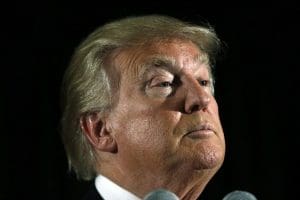The case against Trump: He clearly knew about Russian interference
In May 2016, Director of National Intelligence James Clapper sounded the alarm about “indications” that 2016 political campaigns were being targeted by cyberattacks. He stated that “as the campaigns intensify, we’ll probably have more of those [attempts].” In June, officials at the Democratic National Committee and cyber security experts revealed that the DNC computer network […]

In May 2016, Director of National Intelligence James Clapper sounded the alarm about “indications” that 2016 political campaigns were being targeted by cyberattacks. He stated that “as the campaigns intensify, we’ll probably have more of those [attempts].”
In June, officials at the Democratic National Committee and cyber security experts revealed that the DNC computer network had been breached, and described the breach as having been “traditional espionage” committed by “Russian government hackers.” According to the report, some of the hackers had access to the network for “about a year.”
On July 20th, Trump’s advisers were successful in weakening the GOP platform with respect to Ukraine. The move, which clearly stood to benefit Russian President Vladimir Putin, was surprising, according to a GOP platform committee member, “given the Trump campaign representatives’ ‘relatively hands-off approach’ to other parts of the GOP’s national-security platform.” It also signaled a change in Trump’s position, as he had previously argued “multiple times that he thought the West should respond more forcefully to Russian aggression,” though “his tone on Ukraine and Crimea appeared to shift after he hired [Paul Manafort] to manage his campaign in April 2016, as Politico’s Michael Crowley has reported.”
On July 22nd, WikiLeaks began releasing tens of thousands of emails and attachments garnered from the Russian hack of the DNC as part of what it described as its “new Hillary Leaks series.” On July 25th, Trump “joked” that the emails were being released because “Putin likes me.”
The new joke in town is that Russia leaked the disastrous DNC e-mails, which should never have been written (stupid), because Putin likes me
— Donald J. Trump (@realDonaldTrump) July 25, 2016
On July 27th, Trump held a press conference in which he “invited” Russia to hack Hillary Clinton’s private email server. Trump’s invitation is notable because Clinton was not only a presidential candidate but is also a former U.S. Secretary of State. Thus Trump’s words were an appeal to a foreign power to commit espionage against a U.S. government official.
The important takeaway here is Trump knew Russia was hacking into U.S. political and governmental infrastructure and encouraged the activity overtly.
Over the next two months, WikiLeaks continued to release emails from the hack of the DNC. The sometimes embarrassing but relatively benign contents of those emails dominated news media coverage of the Clinton presidential campaign:
[media-credit name=”MMFA” align=”aligncenter” width=”705″] [/media-credit]
[/media-credit]
In September, there was reportedly a secret intelligence briefing for Congressional officials about the hacking by Russia. According to officials present at the briefing, GOP Senate Majority Leader Mitch McConnell voiced doubts about the accuracy of the information. When presented with information from U.S. intelligence sources about a foreign power attempting to interfere with a U.S. presidential election, the leader of the Republican Party in the U.S. Senate not only failed to take such interference seriously as a threat to national sovereignty, he reportedly denied it was even true.
On October 7th, the Department of Homeland Security and the Office of the Director of National Intelligence released a joint public statement saying they were “confident” the Russian government directed the hacks in order to “interfere with the election process.”
On October 18th, interim DNC Chair Donna Brazile took the extraordinary step of writing directly to the Chair of the Republican National Committee, Reince Priebus, to make a plea for a bipartisan response to Russia’s hacking and interference in the election.
This is absolutely crucial to understand: Republican Party leaders at the highest levels knew Russia was hacking into U.S. political and governmental infrastructure and encouraged the activity by their failure to act or even to speak out in a bipartisan way on behalf of national sovereignty and security.
To give you a sense of the severity of Russian actions, President Obama used a hotline created to respond to nuclear war threats to communicate a warning to Putin on October 31st in advance of Election Day. Former CIA Director Michael Morrell called Russian activities “the political equivalent of 9/11.” Former POW and Chair of the Senate Armed Services Committee John McCain has since called Russia’s actions “acts of war.”
On November 8th, Trump won the majority of electoral college votes but lost the popular vote. Once all the ballots were counted, Clinton won the national popular vote by almost 3 million votes, a lead of 2.1 percent over Trump, according to the non-partisan Cook Political Report.
On December 9th, President Obama called for a complete review by the U.S. intelligence community on Russian hacking and efforts to influence the election. In the same month, American intelligence agencies publicly announced they had concluded with “high confidence” that Russian hacking and dissemination of the information obtained was intended not only to hurt Clinton but actually to help Trump gain the office of the presidency. Senior officials also revealed that intelligence gained from diplomatic sources and spies working for U.S. allies showed Putin personally directed how the hacked materials were used.
Democratic Senator and then-Majority Leader Harry Reid continued to sound the alarm about the impact of Russian interference and to demand the Electors be given a confidential briefing before they cast their ballots for president. But DNI Clapper declined to give such a briefing.
On January 5, 2017, the chiefs of the U.S. intelligence community organizations met with President Obama to give him a classified briefing about the contents of their review. On January 6th, the chiefs gave the same briefing to President-elect Trump. A non-classified version of the Intelligence Community Assessment titled “Assessing Russian Activities and Intentions in Recent US Elections” was also released to the public. While the public version did not contain certain supporting materials, the conclusion was the same:
We assess Russian President Vladimir Putin ordered an influence campaign in 2016 aimed at the US presidential election. Russia’s goals were to undermine public faith in the US democratic process, denigrate Secretary Clinton, and harm her electability and potential presidency. We further assess Putin and the Russian Government developed a clear preference for President-elect Trump. We have high confidence in these judgments.
The following week, reports emerged about a synopsis on a separate but related subject included in the confidential briefings regarding materials possibly possessed by the Russian government — materials which they could be using or could use in the future to coerce Trump. A 35-page kompromat dossier containing such materials was also made public which contains serious but, as yet, unsubstantiated allegations of direct coordination and communications between the Trump campaign and the Russian government during the election, including an alleged quid pro quo for the aforementioned orchestration of the GOP platform’s position on Ukraine: “Trump ‘agreed to sideline’ the issue of Russian intervention in Ukraine during his campaign after Russia promised to feed the emails it stole from prominent Democrats’ inboxes to WikiLeaks.”
In response to briefings about these national security concerns, President-elect Trump could have chosen to take a sober view and recognize the threats they present to his presidency and to our nation as a whole. Instead, he has doubled-down and continued his furious attempts to delegitimize the Intelligence Community and to sow distrust among his followers for the findings and competency of the I.C. Additionally, he has continued to voice nothing but praise for Vladimir Putin and to regurgitate Kremlin talking points denigrating NATO, questioning the solidity of the European Union, and praising BREXIT.
Following a confidential briefing on Russian actions during the election made by leaders of the IC to all members of Congress last week, and specifically citing those revelations as a reason, Georgia Democratic Representative John Lewis was pointed and specific in his assessment of Trump, saying, “I don’t see the president-elect as a legitimate president.” He also revealed he would not be attending the presidential inauguration as a result. Since Lewis has spoken out, more than 40 Democratic representatives have joined the boycott of the inauguration, a number which continues to grow. Notably, Putin has publicly come to Trump’s defense:
BREAKING: Russian President Vladimir Putin accuses outgoing US administration of trying to undermine Trump's legitimacy.
— The Associated Press (@AP) January 17, 2017
So, here we are. This. Is. Happening.
Mere days before the inauguration, the question is no longer whether Trump or the GOP leadership knew Russia was violating U.S. sovereignty and attempting to install Trump as president. They did know. The question now is to what degree Trump, his representatives, and the GOP were actively complicit.
This is happening, but we will not sit quietly by while our country is co-opted by an illegitimate president beholden to a foreign power. Let this serve as notice to the incoming administration: Trump might have been elected with the help of a foreign power, but he and other GOP leaders are ultimately responsible to the American people. We will do our part to hold them accountable and will #RESIST this attack on our democracy.
Recommended

Biden campaign launches new ad focused on Affordable Care Act
Former President Trump has said he wants to do away with the popular health care law.
By Kim Lyons, Pennsylvania Capital-Star - May 08, 2024
Trump leaves door open to banning medication abortion nationwide
Donald Trump is planning to release more details in the weeks ahead about how his administration would regulate access to medication abortion, according to comments he made during a lengthy interview with Time magazine published Tuesday.
By Jennifer Shutt, States Newsroom - April 30, 2024
Biden on abortion rights: President expects to give speech Tuesday on new Florida 6-week ban
‘Having the president of the United States speaking out loud and with confidence about abortion access is a great thing’
By Mitch Perry, Florida Phoenix - April 22, 2024







































































